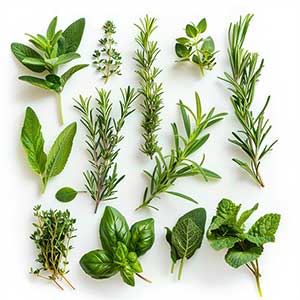Mediterranean Herbs typically encompass a range of aromatic plants such as rosemary, basil, thyme, lavender, and oregano, which are native to the Mediterranean region. These herbs are renowned for their robust, fresh, and aromatic qualities that capture the essence of Mediterranean landscapes, from sunny hillsides to breezy coastlines. The aroma of Mediterranean herbs is characterized by its green, spicy, and slightly floral nuances, making it a popular choice in the formulation of perfumes that aim to evoke natural freshness and herbal warmth.
The history of using Mediterranean herbs in perfumery stretches back to ancient civilizations, including the Greeks and Romans, who celebrated these herbs for their aromatic properties in various ceremonies and rituals. In modern perfumery, Mediterranean herbs are often used to impart a crisp, clean, and somewhat earthy note to fragrances, particularly in colognes and fragrances categorized under the herbal, fresh, and chypre families. They add a touch of nature-inspired freshness that is both uplifting and grounding.
The essential oils of these herbs are typically extracted through steam distillation, capturing the delicate volatile compounds responsible for their distinctive scents. This process ensures that the vibrant character of the herbs is preserved, bringing a piece of the Mediterranean's aromatic flora to the wearer.
Natural or Synthetic?
The essential oils of Mediterranean herbs are extracted naturally through steam distillation. This method is preferred as it effectively captures the complex array of volatile compounds in the herbs, maintaining the integrity and freshness of their scents.
Fragrance Families Mediterranean Herbs Most Commonly Found In
Show fragrances that contain Mediterranean Herbs as a note




